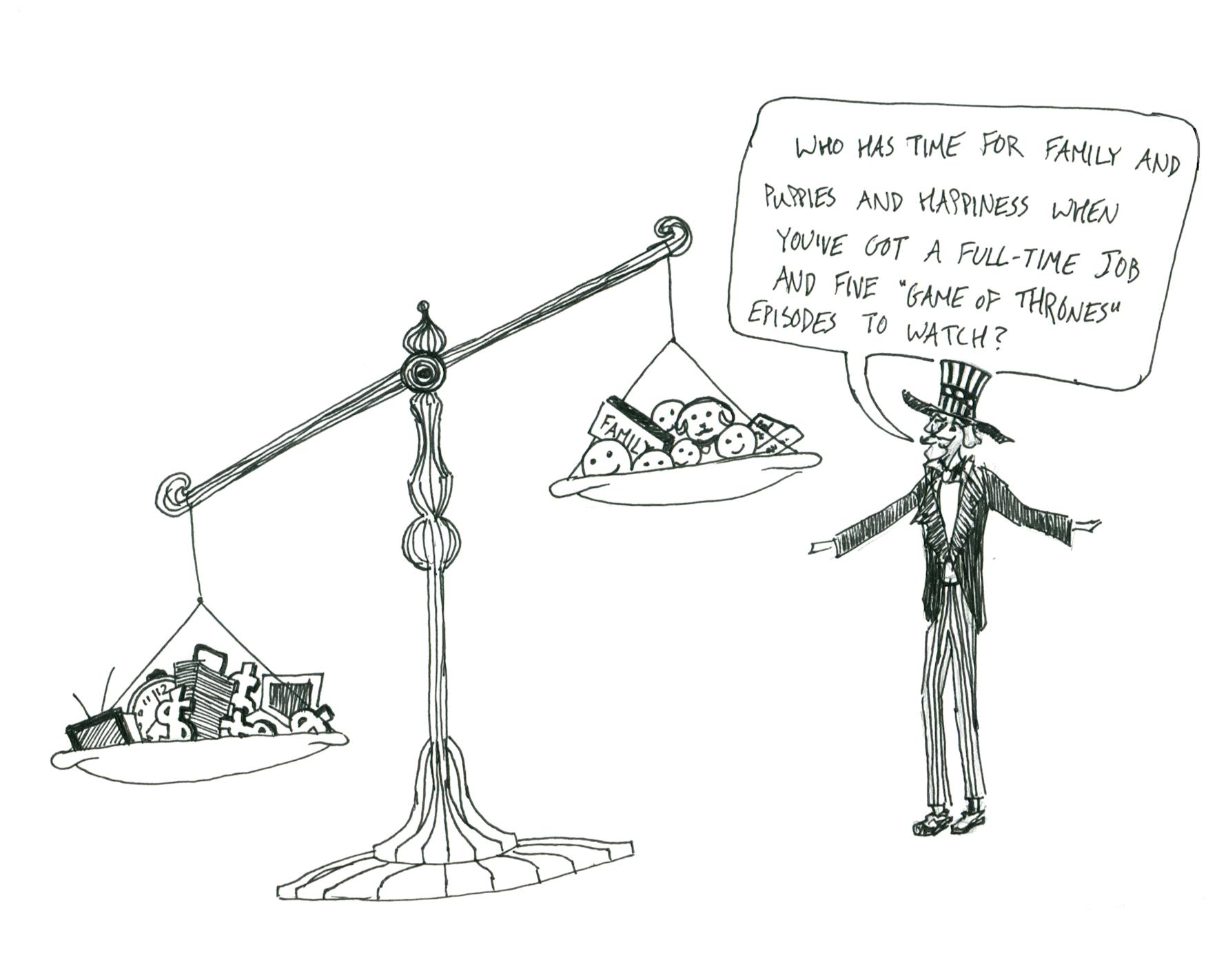Acknowledge societal benefits of increased happiness
Do we care about being happy anymore? According to an Oct. 27 New York Times opinion piece, we do. Ruth Whippman asserts that “good social relationships are the strongest, most consistent predictor there is of a happy life,” and also that “the average American spends barely more than half an hour a day on social communication.” So where’s the disconnect? The problem with happiness is that we simply don’t value it. We say we do, of course, because saying we don’t care would be blasphemous. But by the numbers, happiness is far down the societal priority list as income inequality and a competitive, numbers-driven society pressures us economically.
The disregard for happiness is a recent phenomenon. The erosion of the middle class and the increasing competitiveness of the job market at all levels has turned American society into a scratch-and-claw fight for rank and position. As we rearrange priorities to cope with these demands, the first thing jettisoned is our personal well-being. According to a Sept. 27 Washington Post report, the United States ranks as the “second-most ‘competitive’ economy” in the world but “lags behind when scored for health and primary education.” As our economic productivity surges, the resources that support the people integral to it fall behind.
From an economic perspective, we should be invested in happiness because happy people are more productive. This shouldn’t surprise us, as we know the devastating effects that depression and stress can have on work lives. A 2015 study by the Social Market Foundation involving 700 employees showed that the effects of happiness in the workplace are dramatic. The experiment, which involved exposing employees to a “happiness shock” such as funny video clips or giving them snacks, showed that “productivity increased by an average of 12 percent, and reached as high as 20 percent above the control group.” The happy employees demonstrated more effort and were more likely to push through obstacles as opposed to getting frustrated and giving up.
So, what can we do? On an individual level, we can reprioritize our time. The average American spends over five hours per day watching television, according to a 2016 Nielsen report. Cut that down to two, which is still enough time for two hourlong episodes or a full NBA game, and we have three hours to play with. Give one and a half of those to sleep, which the Center for Disease Control says 35 percent of adults are not getting enough of, at a minimum standard of seven hours a night. Then, take the other hour and a half to have dinner with a friend or talk to a family member. Though it may not feel as productive as grinding it out in the library, science shows that “across race, age, gender, income and social class,” more meaningful social interaction overwhelmingly leads to more happiness, according to the aforementioned Oct. 27 New York Times article.
On a workplace level, it might be time to knock down the cubicle walls for good, as Michael Bloomberg did both as mayor of New York City and as CEO of Bloomberg LP. According to an Aug. 1, 2016 Bloomberg article, 2016 research by Harvard Business School and Cornerstone OnDemand revealed that “the ideal seating plan still involves sitting almost on top of your co-workers.” An open floor plan, especially one that places bosses in the middle of the action, fosters inclusion and collaboration in a space that is too often negatively viewed as competitive. According to a 2013 study of European workers by Deloitte, collaboration both in person and digitally contributed to boosts in happiness and productivity. Putting the boss or supervisor with the employees instead of in a removed office eliminates some of the stigma of asking for help, and as those in leadership positions generally have more experience and knowledge, it is better that they can share it more readily.
On a societal level, things are more difficult. Most of the world is living where income inequality is on the rise, according to an Oct. 11 MarketWatch report. As the chasm widens, pressures amplify. It’s unlikely to get better soon, according to a Feb. 8 Pew Research Center report, “unemployment will rise” as “smarter, more-efficient algorithms will displace many human work activities” in the white-collar market. This information comes as automation is already displacing blue-collar jobs. Eventually, as the money and power become concentrated in the hands of people who own those machines and technologies, America will have to move toward a form of democratic socialism in which there is a wage for living. Then, when our efforts are not singularly focused on climbing the ladder of life, we can get back to being happy.




Please note All comments are eligible for publication in The Justice.